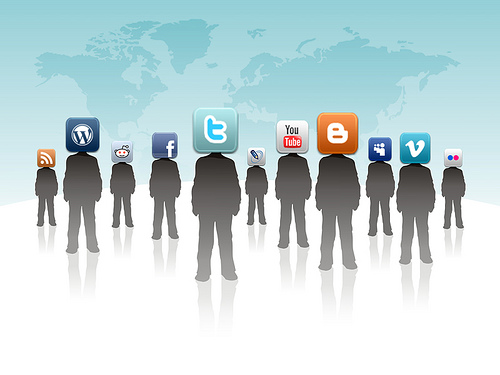Photo by Rosaura Ochoa, via flickr
Moises Fuertes/Staff Writer
Do you “share” content on Facebook, Twitter and Tumblr? Do you find yourself commenting on articles via social media sites and striking discussions on these sites as well?
Welcome to Web 2.0, coined by Darcy Dinucci in 1999 and popularized by Tim O’Reilly in 2004. In other words, the Internet as we know it today.
In the midst of this shift in website infrastructure, we come to recent times where social media─ namely, participatory media─ is not only the status quo, but also necessary.
A necessity which, in my opinion, is human at its core, while futuristically emphasizing what the Net is meant to be: a free forum for all.
Communication is, and will continue to be, king.
It is no secret that humanity is a social species. The popularity of social media websites might seem redundant or exaggerated to some, but in reality, makes sense. The Net has allowed anyone with an Internet connection to communicate easily, create effectively and distribute said creations freely. That combination has exploded participatory media and given rise to organizations like Creative Commons, an organization that makes it simple to share creativity and knowledge through their free licenses, which work alongside copyright to protect the content legally.
[pullquote]
In terms of the discussion itself, and the posts from other people, it is important to hear those authentic and honest thoughts from other individuals.
Brandon Wright
Junior
Broadcast Journalism
[/pullquote]
Participatory media is a big part of the Net. In a nutshell, participatory media has allowed consumers to become producers. Essentially, we are all able to create content now, whether it be video, blogs, or websites. The fact the general public can create content is what is of importance here. We all create content by posting on Facebook, for example, which usually leads to discussions via comments. This empowers us to share our ideas and communicate online.
Junior Brandon Wright, a broadcast journalism major, believes that participatory media encourages discussion online on social media sites.
“In terms of the discussion itself and the posts from other people, it is important to hear those authentic and honest thoughts from other individuals,” said Wright.
Those individual thoughts may not seem that important, but through closer inspection, I’ve found it is this exact method that allows for groups to get together and work on projects, productions, records and more, thanks to the Net.
The more knowledge becomes accessible on the Net, the better society will become. Those “How To” videos on YouTube, which are abundant, teach people how to do something. Through YouTube alone, we can already see the impact this free culture is having on the rest of society. Kids born today have unlimited knowledge a search and click away, a testament to our generation and those to come.
We communicate and we learn. In this way, participatory media and the Net are changing the way the world functions and learns.
moises.fuertes@fiusm.com






Be the first to comment on "Participatory media: advancements in communication"